
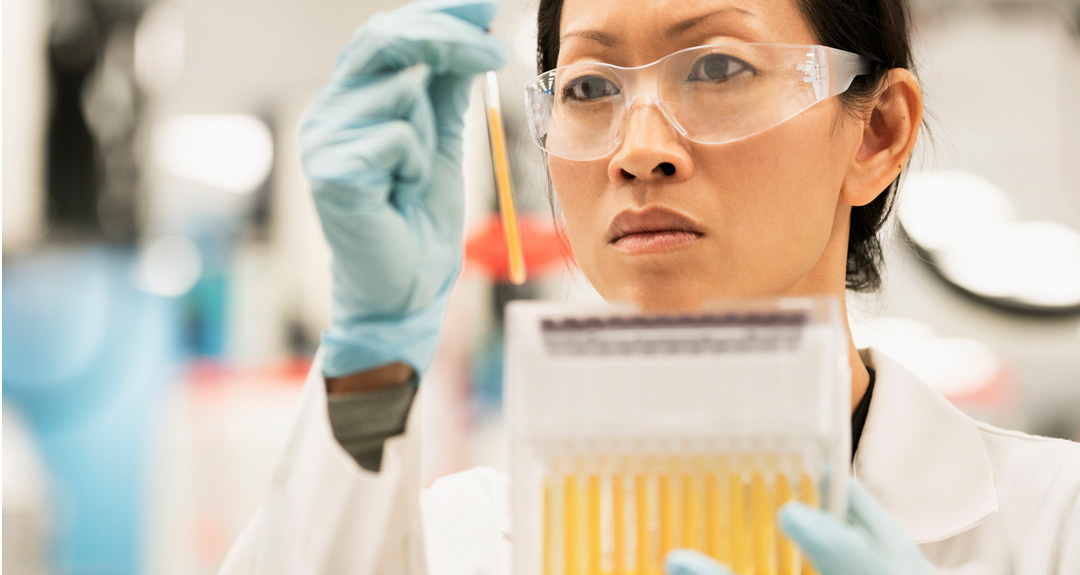
Our investments are enabling researchers to advance the understanding of Inflammatory Bowel Disease.
Prediction, Prevention, Cure
Playing the long game is inherent to scientific research to cure complex chronic diseases like Inflammatory Bowel Disease (IBD). With an eye toward that future, we announced a new strategic focus for our growing Health portfolio. We set our sights on dramatically transforming the prediction and prevention of IBD on a steady path to finding a cure.
Our aim is to be more patient-focused by helping the field advance along the spectrum from discovery science to direct patient impact. A greater emphasis on translational research will increase the potential to improve patient well-being. We also expanded our scope to consider complementary and nontraditional therapies and promising new technologies. We will proactively seek out the field’s leading scientific and medical researchers, identify novel ideas and promote partnerships.
As a first step, we launched an online resource to guide potential grantees, inspire collaborations and document the impact we’re making in the field. We want to elevate the extraordinary work of our grantees by sharing what they are testing and learning. We also hope to entice participation by additional funders and partners. Researchers responded enthusiastically to this new microsite, reflecting their interest in pursuing ideas that bridge the lab and clinical practice.
“Our aim is to become more of an initiator in the field.”
—Laura Wilson, PhD, Director of Health Strategies and Innovation
28
Number of early-career researchers who received travel awards to present research at our 2017 Innovations Symposium
![]()
![]()
162 abstracts, posters, peer-reviewed articles and patent filings were created by our Health grantees in 2017
$6M
Amount invested by the Rainin Foundation in 2017 to support cutting-edge Inflammatory Bowel Disease research
![]()

We support opportunities for researchers to collaborate, increasing connections that nurture discoveries.
Sparking Collaboration
The Rainin Foundation is no stranger to the power of collaboration. We see across our programs how synergistic connections can lead to cutting-edge ideas and accelerate progress. Our strategic priorities place an even greater emphasis on this long-standing value.
A central tenet is to foster networks that connect investigators to new tools and knowledge—and to each other. Our annual Innovations Symposium encourages such cross-disciplinary interactions. We met a new milestone in 2017 with our sixth Symposium, which sold out for the first time and drew our most diverse gathering ever. Clinicians and scientists from multiple disciplines joined industry and biotech start-ups and representatives from government, high-level scientific journals and academia. Panels combined academic researchers with industry leaders to share new ideas for working together. One panel included Genentech, Stanford University’s SPARK Program and Janssen Research & Development.
Another important feature is our travel awards, which more than tripled in 2017 to enable 28 early career researchers to attend the event. This opportunity allows them to build their own networks, present research and gain insights and inspiration from top researchers in the field.
A new area of collaboration lies in the creation of joint funding ventures with fellow IBD funders. Our publication, A Giving Smarter Guide, identified philanthropic opportunities for supporting the translation of basic research into novel treatments. We are cultivating our relationships with the field’s philanthropic leaders to facilitate scaling and synergistic impact, and accelerate progress toward a cure.
“The Innovations Symposium is a fantastic opportunity for IBD researchers from all areas of science!”
—Karina Mariño, PhD, Instituto de Biologia y Medicina Experimental
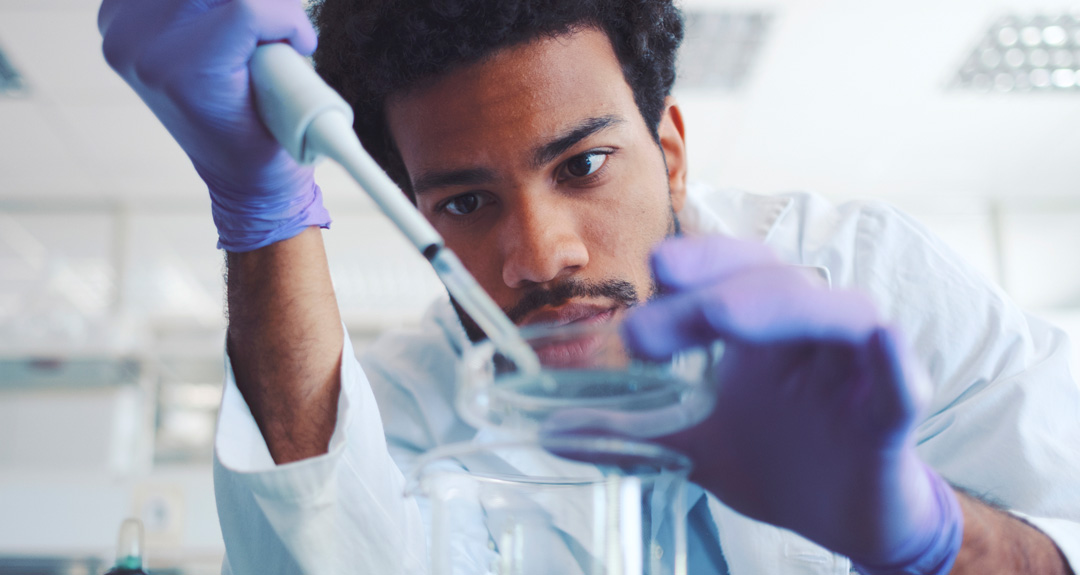
Our grantees are engaged in basic, translational and clinical research that has the potential to dramatically transform the prediction and prevention of IBD.
Embracing the Long View
The complexity of IBD demands tenacity and the long view—among researchers, clinicians and patients alike. We are inspired time and again by their dedication, endless curiosity and—especially with those suffering from IBD—steady courage. Our grantees’ work reflects examples across the full spectrum of research areas. Even small advances are showing the potential to translate into thrilling breakthroughs.
One example is Dr. Kate Fitzgerald, whose team is studying our innate immunity to infection and disease, and the mechanisms controlling the inflammatory response. An unexpected finding drew her team into the uncharted science of a single RNA molecule. Long assumed to have no biological function in immunology, it appears to act as a brake on immune activation. There is a long way to go before the development of therapeutic applications in this area. Even so, discoveries such as this are exciting advances in combating IBD.
“We stumbled on what might be the tip of the iceberg in our understanding and treatment of inflammatory disease.”
—Kate Fitzgerald, PhD, University of Massachusetts Medical School
At the other end of the spectrum, patients who waited more than a year were able to enroll in a pilot study we funded. Their Bay Area research team is investigating delivery and dosing methods for microbial restoration. Our 2016 report laid important groundwork for understanding key research questions about fecal microbiota transplantation (FMT) as a mechanism for restoring microbial health in IBD patients.
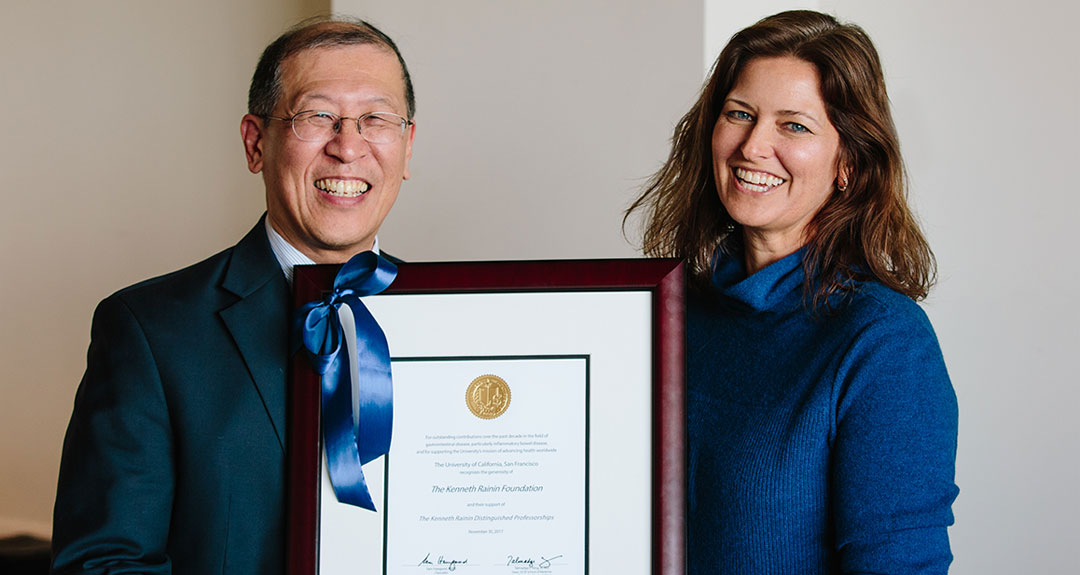
Dr. Averil Ma, chair of the Rainin Foundation’s Scientific Advisory Board, with Dr. Jennifer Rainin, CEO. Photo credit: Sonya Yruel
An Entrepreneurial Legacy
In November, the University of California, San Francisco (UCSF) celebrated a 10-year milestone in Kenneth Rainin’s legacy. His $15 million gift in 2007 propelled a decade of research at UCSF’s Colitis and Crohn’s Disease Center. Opened in 2002, the Center expanded because of Mr. Rainin’s entrepreneurial dedication to medical research and patient care, and his confidence in UCSF researchers. It is now one of the nation’s leading hubs for IBD research and treatment. Their researchers are pioneering efforts to explore emerging areas like the microbiome alongside state-of-the-art treatment and a holistic care program to manage the disease.
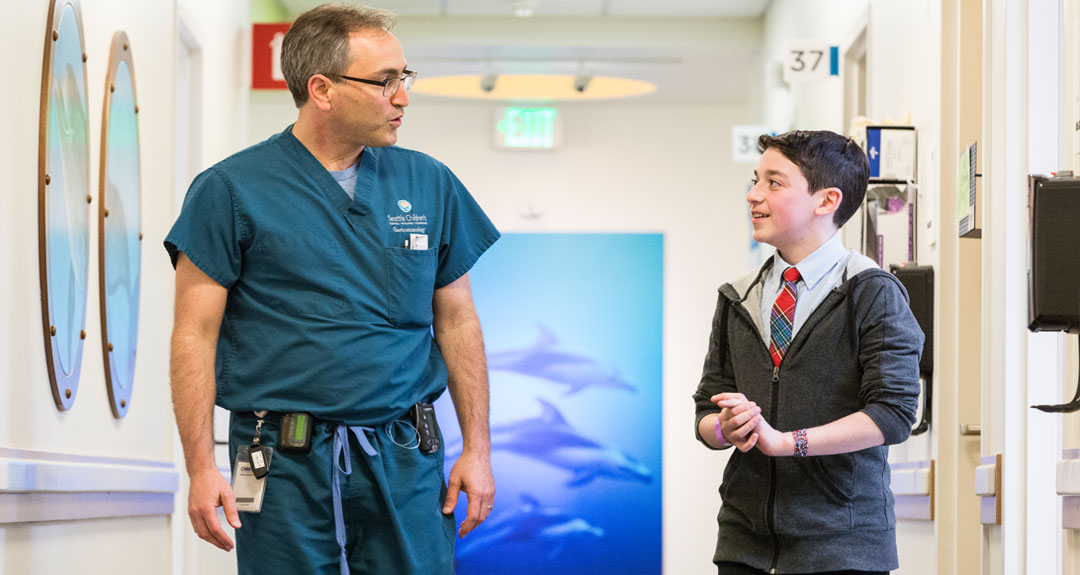
Dr. David Suskind’s work on low carbohydrate diets holds promise for children with Crohn’s disease. Photo courtesy: Seattle Children’s Hospital
Promoting Innovation and Synergy
The Rainin Foundation funds projects with the potential to yield transformative discoveries and insights into predicting and preventing IBD.
Our Innovator Awards advanced IBD research on several fronts, providing initial and renewed support at critical stages for high-risk research. Funded projects reflect an array of basic, translational and clinical science related to the microbiome, immunity and inflammation, and diet and nutrition. Grantees include an increased number of early-career investigators, as well as new research exploring the potential role of stem cells or dietary cholesterol, and using human intestinal organoids to model IBD pathogenesis.
The work of this international pool of researchers could lead to breakthrough discoveries about IBD and directly impact patients. The pilot studies inform future larger trials. For example, Dr. Benoit Chassaing’s pilot study with human subjects will investigate how dietary emulsifiers are able to directly impact intestinal microbiota.
Our Innovator Awards include the potential for two additional years of funding for projects that demonstrate significant progress. Our hope is that these projects will transition preliminary findings to trials that gauge impact on patient management and well-being. Dr. David Suskind’s work on low carbohydrate diets holds such promise for children with Crohn’s disease. His double-blind study will test whether diet alone can lead to clinical and biochemical remission for these patients.
Our Synergy Awards enable teams of investigators to pool their talents and resources around a research goal that would not be possible if they worked independently. With robust resources and institutional backing, our 2017 Synergy Award grantees are positioned to achieve tangible results and advance our understanding of IBD.
One of those awards was a first-time grant to Dr. Aida Habtezion and her collaborators at Stanford University. Her cross-disciplinary team is testing an encouraging hypothesis that the microbiome has a direct influence on IBD. A collaborative, “bedside to bench” spirit infuses other efforts by her lab as well. They created an online platform for scientists, clinicians and patients to share human data and foster communication across disciplines.
“By encouraging synergistic projects, we will develop connections and networks that will benefit not only patients with IBD, but the scientific community as a whole.”
—Laura Wilson, PhD, Director of Health Strategy and Ventures
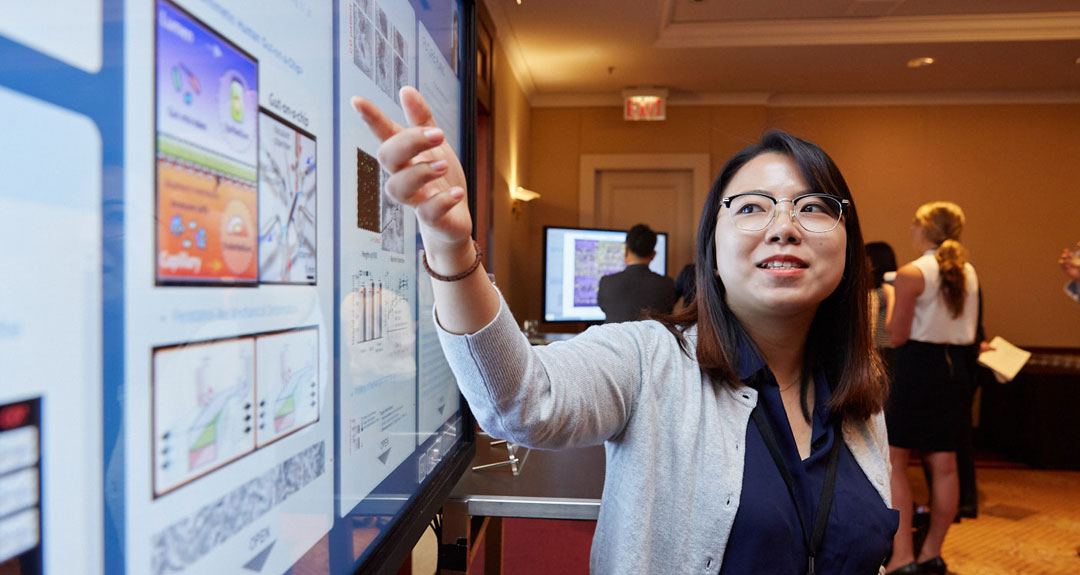
Presenting research at our 2017 Innovations Symposium. Photo credit: Mitch Tobias
Advancing Prediction and Prevention: 2017 Grantees
We support groundbreaking ideas that have the potential to dramatically transform the prediction and prevention of Inflammatory Bowel Disease.
INNOVATOR AWARDS
Funds research projects that have the potential to push the boundaries to advance IBD research. View more information about these grants.
Megan Baldridge, MD, PhD, Washington University
Ilana Brito, PhD, Cornell University
Benoit Chassaing, PhD, Georgia State University
Timothy Hand, PhD, University of Pittsburgh
Holly Ingraham, PhD, University of California, San Francisco
Ophir Klein, MD, PhD, University of California, San Francisco
Noah Palm, PhD, Yale University
Read Pukkila-Worley, MD, University of Massachusetts
George Rainger, PhD, University of Birmingham
Andrea Reboldi, PhD, University of Massachusetts
Neal Silverman, PhD, University of Massachusetts
INNOVATOR AWARDS – CONTINUED SUPPORT
Provides up to two years of additional support to researchers who demonstrate significant progress toward their goals. View more information about these grants.
Milena Bogunovic, MD, PhD, Pennsylvania State University
Ken Cadwell, PhD, New York University
Jean-Frederic Colombel, MD, Icahn School of Medicine at Mount Sinai
Mohamed Abou Donia, PhD, Princeton University
Jun Huh, PhD, Harvard University
Iliyan Iliev, PhD, Weill Cornell Medical College
Kate Jeffrey, PhD, Massachusetts General Hospital
Nobuhiko Kamada, PhD, University of Michigan
Tim Lu, MD, PhD, Massachusetts Institute of Technology
Rick Maizels, PhD, University of Glasgow
Eric Martens, PhD, University of Michigan
Corinne Maurice, PhD, and Irah King, PhD, McGill University
Gabriel Rabinovich, PhD, and Karina Mariño, PhD, Fundacion Instituto de Biologia y Medicina Experimental
David Suskind, MD, Seattle Children’s Hospital
Kevin Whelan, PhD, King’s College London
SYNERGY AWARDS
Encourages investigators with diverse expertise to pool their knowledge and resources towards a goal they could not achieve independently. View more information about these grants.
Gwendalyn Randolph, PhD, Washington University; Saurabh Mehandru, MD, Icahn School of Medicine, Mount Sinai; and Daniel Mucida, PhD, Rockefeller University.
SPECIAL INITIATIVES
The Foundation continually looks for ways to advance and support our mission through investments. Invitation only. View more information about these grants.
William DePaolo, PhD, University of Washington
Explore the Foundation’s website to learn more about our Health program.
